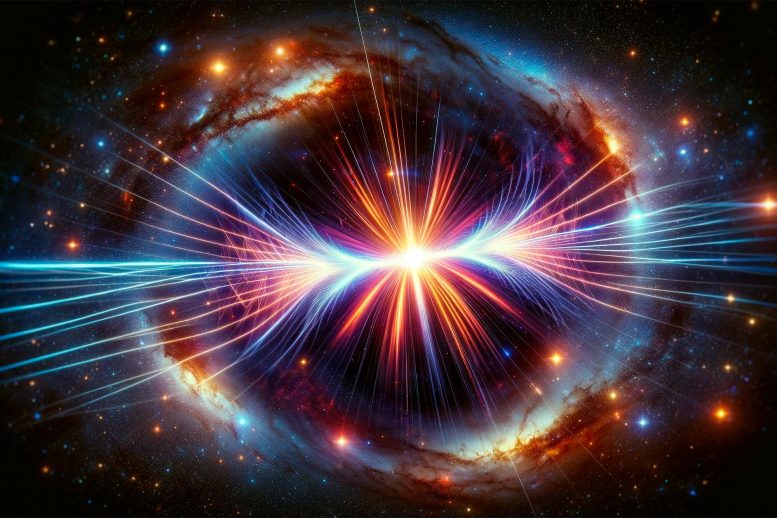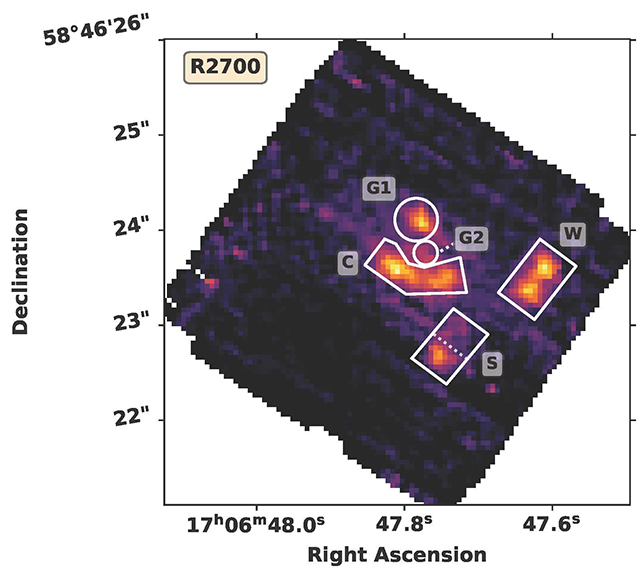-
How To Read The Night Sky: The Best New Books On Space For 2024
The night sky is the most exciting, precious and threatened resource we humans have. Since it’s always been central to the human experience of the world, it offers a rich vein for writers, but most books on the subject utterly lack emotion. Not so these three highly original titles hitting the shelves in 2024, which…
-
Astronomical Mystery: Strange Radio Signal Detected From Outside the Milky Way

Astronomers have discovered unique patterns in a repeating Fast Radio Burst (FRB 20220912A), observed by the SETI Institute. This finding, described in the Monthly Notices of the Royal Astronomical Society, challenges existing models of FRBs, which are intense, short-lived radio signals from space. Credit: SciTechDaily.com New research reveals a never-before-seen behavior in a repeating Fast…
-
Oversized Ancient Galaxy Isn’t What Astronomers First Thought

The early Universe was a wild time. In the first 2 billion years following the Big Bang 13.8 billion years ago, star formation positively roiled, and galaxies flared to life in the darkness, collided, and grew. Interpreting the light that has traveled so far across space and time can be difficult, and we don’t always…
-
Behold–the Best Space Images of 2023
The year 2023, like every other one before it—and, no doubt, every year to come—has had its crests of good news and its troughs of bad tidings. But one constant, reliable source of awe and beauty is the sky over our head. After journeys of mere seconds to billions of years, the light from astronomical…
-
Meet Taters, the cat who starred in the video streamed from space
Taters, NASA’s Laser Beam Motion Analyst. Credit: Joby Harris/Instagram via taters_space_cat Taters, a 3-year-old orange tabby cat, is having his 15 seconds of fame. The world met Taters after NASA used a laser to stream a test video of the feline 19 million miles from the Psyche spacecraft to Earth on Dec. 11. The footage,…
-
All Astronomical Events 2024: Detailed Stargazing Calendar
Get ready to observe the sky in 2024! Our comprehensive list of all the year’s astronomical events will ensure you don’t miss a single celestial spectacle. Contents To stay updated with celestial events, check the astronomical calendars in the Star Walk 2 and Sky Tonight stargazing apps. There, you can find the exact date and…
-
What are the hazards of living in space? Swollen heads, for one
NASA astronaut Christina Koch stops for a picture while replacing equipment on the International Space Station. Credit: NASA Recently there has been a surge in commercial spaceflight. So, while regular human spaceflights beyond low-Earth orbit are still far off on the horizon, they appear to becoming an inevitability in the coming decades. To prepare for…
-
Your Stargazing Calendar for 2024: Catch a Total Solar Eclipse, 2 Lunar Eclipses, and More
Stargazers will see plenty of enchanting sights in 2024, but the most mesmerizing may be a total solar eclipse on April 8, which will be visible in most of North America, including 15 U.S. states that will experience totality. You’ll also be able to view an annular solar eclipse, two lunar eclipses, 12 meteor showers,…
-
The First Secret Asteroid Mission Won’t Be the Last
AstroForge, a private company, wants to mine a space rock, but it doesn’t want the competition to find out which one. For generations, Western space missions have largely occurred out in the open. We knew where they were going, why they were going there and what they planned to do. But the world is on…
-
How large is the universe? This Week in Astronomy with Dave Eicher
The massive galaxy cluster RXC J0142.9+4438 is seen in this image taken by the Hubble Space Telescope. Credit: ESA/Hubble & NASA, RELICS Just how large is the universe? The short answer is 93 billion light-years — at least. That 93 billion light-year number refers to what astronomers call the observable universe, and it extends about…